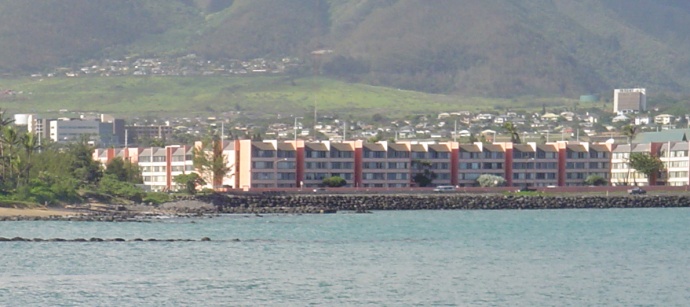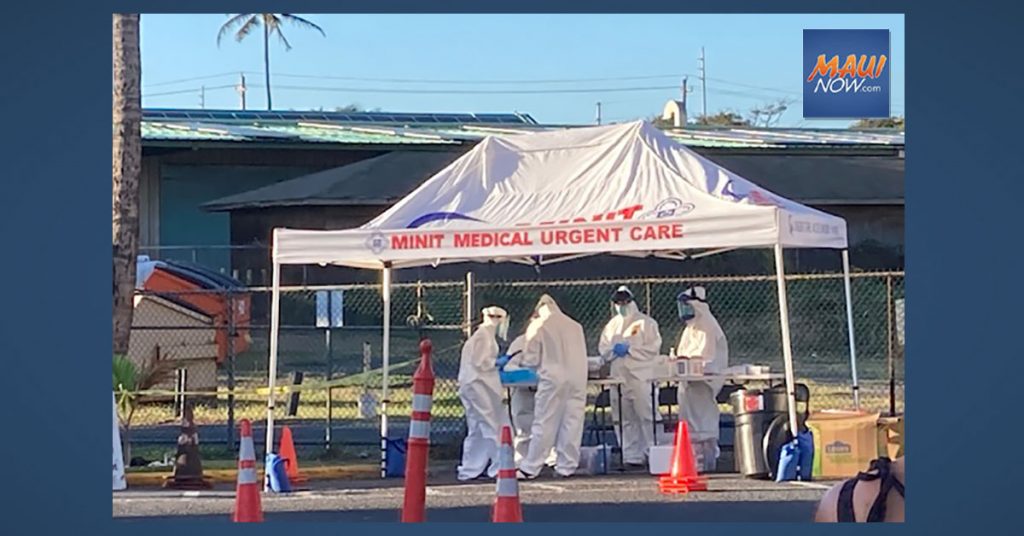Harbor Lights Professional Sanitation Takes Place Tonight; County Says they Believe the Cluster Began with Holiday Choir Practice

The Harbor Lights condominium complex in Kahului will undergo professional sanitation this evening (on Sunday, Jan. 3, 2021) in response to a COVID-19 cluster that was first reported on Monday, Dec. 21, 2020.
In the meantime, janitorial staff of Harbor Lights have completed their own deep cleaning and have been sanitizing public areas more frequently, according to Teri Freitas Gorman, Senior Communications Advisor with the Office of the Mayor.
On New Year’s Eve, Mayor Victorino said there were 30-plus cases, following an initial report of 10 last week Monday. That was the same day testing was conducted on site at the Central Maui property. COO/Manager, Steve Johnson said a total of 264 tests were conducted that day–about one fifth of the total residential population of the complex, which has 351 units.
This comes as the two-week case count for the entire Kahului zip code swelled to 69 on Saturday, Jan. 2, surpassing the 60 cases reported in Lahaina over the same 14-day period. Today, the two-week total for Kahului increased to 84, according updated mapping provided by the state Department of Health.
The state Department of Health cluster report did not appear to reflect the full impact of the cluster in an update issued on Christmas Eve. (Scroll to the bottom of this article to view the cluster report).
The Board of Directors at Harbor Lights did not accept the Mayor’s offer to sanitize the buildings immediately saying the recommendation did not sync with what they were being told by the Department of Health, according to COO/Manager, Steve Johnson.
According to Johnson, concerns were expressed for some residents whose health conditions might be exacerbated by the use of harsh chemicals, and the property board sought additional information on cleaning products proposed for use.
He noted that the complex has a very large disadvantaged population that could face more severe impacts from the virus and wanted to ensure their needs were addressed.
“We looked into it and made a decision to do it within a few hours,” according to Johnson. During that time the mayor publicly stated that he was looking into options and sought an opinion from the Attorney General’s office, as he expressed an urgency to conduct the cleaning as soon as possible.
Ultimately, “Maui County and Harbor Lights management both want to do the right thing for their residents and the wider community,” said Freitas Gorman, noting that forced action is not needed.
Johnson pointed toward logistics saying the decision to do the sanitizing after the testing caused it to be scheduled Sunday evening “because that is the first time the sanitizing company could fit us in.”
When managers became aware of the initial positives, notices went up around the property on public entrances and exits, elevator doors and walls, with a bullet list of precautions to take including recommendations to stay inside and refrain from having visitors.
“It went totally quiet within an hour,” said Johnson, saying there has been good compliance by residents but expressed a need for more support and information.
“There’s no support or safety net. If someone gets COVID, they can’t go to work, there’s no income, and no government safety net for it… There’s been lots of talk of bring in meals, but no information of who is quarantine, (and) who is sick,” said Johnson.
“We have been fully cooperating with the Department of Health since they informed us of our situation on Christmas morning,” said Johnson, noting that he also asked for help with other items considered critical such as masks, hand sanitizer and disinfectant as the situation was unfolding.
In an email communication with Maui Now on Saturday, Freitas Gorman said, “The County of Maui will immediately assist with PPE, hand-sanitizers, etc. and will research what other assistance can be made available to Harbor Lights residents.”
According to Johnson, actions were also taken prior to the discovery of the cluster. “We’ve had this place at least partially shut down since March, excluding as many visitors as we can. We closed the swimming pool nine months ago.”
Johnson said that when the notice indicated a ‘shutdown,’ “that meant and they know if we see people out doing anything besides going to cars and going to the trash, we’ve been correcting their behavior.” Residents are still free to come and go from the property and daily life continues with service providers entering and exiting the property for repairs, deliveries and moving. “The whole place is not on quarantine,” said Johnson. “We don’t even know who is,” he said, noting that there has been a lack of solid information and reporting.
According to Johnson, complex managers also reached out to police to gain mask compliance, requesting they pass through and conduct checks as a reminder for residents. He said compliance has been well over 80% with most wearing masks most of the time. The head of security also posted standard CDC posters around the property.
County officials say it is their understanding that the Harbor Lights cluster began with holiday choir practices.
“Hawaiʻi DOH public health educators know how to share public health information and they are working on this, but everyone can play a role in reminding others to follow public health guidelines. The DOH Maui District Health Office and the County of Maui have been in contact with Pacific Islands churches and organizations throughout Maui County to request their help in sharing multilingual health education with their members,” said Freitas Gorman.
Maui County saw 363 new confirmed cases of COVID-19 during the month of December. County officials say this is higher than all new cases from March through September—seven months—combined.
“According to the DOH, this alarming increase is linked to community spread. The most risky environments is an indoor space with ‘bar-like behavior’—prolonged periods of eating, drinking and talking without wearing masks or keeping social distance,” said Freitas Gorman. “This can be inside a bar or restaurant, but also at social gatherings inside of people’s homes and garages.”
Restrictions on tourism were eased with the reopening of tourism on Oct. 15 with the Safe Travel Program. Governor David Ige also signed a 17th COVID-19 emergency proclamation in December, reducing the state’s mandatory self-quarantine period for travelers entering the state and traveling between counties from 14 to 10 days.
As of Dec. 29, there were over 11,535 individuals participating in voluntary testing programs in Maui County. So far, (since Oct. 18) there have been about 185 positive cases discovered through post-arrival testing.
For the period between Dec. 21 and 27, approximately 78 percent of the positives have been from community exposure that are not travel related; 11 percent were visitors; and 11 percent were residents who had a travel history.
Maui’s COVID-19 cases to date have reached 1,189 including 1,031 cases on Maui, 106 on Lānaʻi and 22 on Molokaʻi.
Despite the high December numbers, the state as a whole ended the year with 21,397 cases over the course of the pandemic. “Even though that number may sound high, we still have the lowest number of positive cases in the entire United States, and even some of the territories,” said Mayor Victorino during a New Year’s Eve press briefing.
A vaccine rollout started in the days before Christmas with first responders and health care workers getting the first doses.
County officials say Maui residents and visitors should understand that the vaccine will not provide the community with sufficient immunity for several months. “In the meantime, we must continue to protect one another by following all public health guidelines,” said Freitas Gorman.
Today’s sanitation is expected to begin at around 8 p.m.







_1768613517521.webp)






